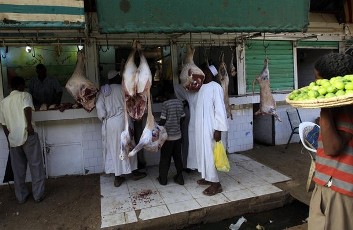Sudanese consumers hit by spiralling food prices
August 17, 2014 (KHARTOUM) – Sudanese markets are witnessing a new wave of price increases to food commodities despite the stability of the exchange rate against the US dollar at around 9.5 pounds (SDG).
 The prices of cooking oils went up along with onions, meat, milk and dairy products, which prompted the government to reduce the tax on imported oil by 30% in an attempt to rein in prices.
The prices of cooking oils went up along with onions, meat, milk and dairy products, which prompted the government to reduce the tax on imported oil by 30% in an attempt to rein in prices.
The price of a 16kg can of peanut oil rose to 550 SDG up from 170 SDG, while other kinds of cooking oils reached 450 SDG, with the exception of sesame oil which hit 800 SDG.
The Sudanese cabinet announced last Thursday that at the recommendation of the minister of finance and national economy that they are reducing the tax on cooking oils from 40 to 10% except palm oil.
The pro-government al-Rayaam newspaper quoted the chamber of industrial oils as blaming the government for the high oil prices and noting that it alerted the authorities three months ago about the looming crisis.
The chairman of the chamber said the situation is a result of speculation in the grain market as well as monopoly.
Head of the Chamber of Exporters Union Wagdy Mirghani hailed the cabinet decision, calling it a positive move and expressing hope that it will contribute to eliminating the shortage and return prices to normal levels.
He also denied any link between exports of oilseeds and the current crisis in cooking oil.
According to a bulletin issued by the Central Bureau of Statistics this month, the annual inflation rate in Sudan reached 46.8% in July, compared to 45.3% in June and 42% in May.
The International Monetary Fund (IMF) said in a report released last month that inflation is expected to drop sharply in 2014 to 18%, compared to 41.9% in 2013.
Double-digit inflation has been one of the most visible features of the Sudanese economy in recent years which suffered a shock after the secession of South Sudan which contained three quarters of oil reserves.
To makes matters worse, the government phased out subsidies twice in 2012 and 2013 on petroleum and food products, triggering demonstrations that were swiftly quelled.
(ST)
